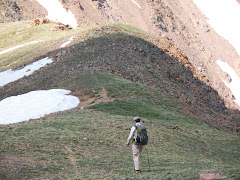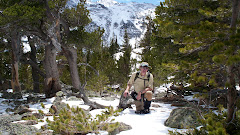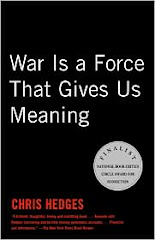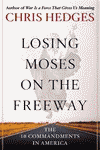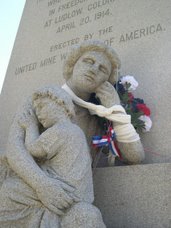The headline on the front page of the Rocky Mountain News screamed out in the largest font – “Barbaric”.
I thought to myself, which act of barbaric are they talking about? But I knew they meant the beheading of two young American soldiers captured when they ended up alone in one vehicle during an ambush.
Of course it’s barbaric. War is barbaric. Is the beheading of two American soldiers any more barbaric than five hundred pound bombs and cruise missiles being fired into civilian neighborhoods where children used to play?
I have to ask myself how many children died in “shock and awe” before “mission accomplished”? We’ll never really know. We will know in the middle of the night an American in a plane made a decision to drop a payload of bombs on a neighborhood he or she couldn’t even see from their planes. We do know cruise missiles were fired at the command of some commander of ship miles away from the targeted neighborhoods.
The shrapnel of those missiles and bombs without a doubt killed sleeping children. The blasts of the detonation without a doubt left children dead from the force of the blast. Their brains were shaken and their vital organs jarred so that they bled internally until dead.
We now know napalm by another name has been used in villages in Iraq. So have white phosphorus bombs and shells.
Soon we’ll see another naked child in a photo with the burns of napalm on their young body. The memory of “willie peter” from Vietnam makes me enraged some child most assuredly died in agony from the effects of the illegal weaponry.
In subtle ways the children die as well. Lack of potable water creates likelihood of disease. Young children are most susceptible to the diseases of bad water. They get violently ill, vomit, have chronic diarrhea and die. Their electrolytes get out of balance, they dehydrate and they are unable to get enough oxygen.
Two American soldiers died a tragic death. The numbers are now over 2500 dead and over 16000 severely wounded. Mothers and fathers mourn for their child. Friends and neighbors mourn. This is the respectful thing to do.
Iraqi mothers and fathers may never find the remains of a child killed in a bomb or missile attack. All visible memory of their child is gone at the funeral. Only pieces of paper with images will remind them of the beauty of their daughter or son.
Iraqi mothers and fathers rush their child to the nearest hospital. They know the disease or the bleeding can be stopped to save their child. They arrive at where the hospital used to be. It too was destroyed by a missile or bomb.
The child will die in the arms of the parents because it’s too late to try another hospital.
These scenes happen day after day after day in Iraq. It doesn’t matter if it’s the Americans in Haditha or Fallujah or the British in Basra or the fanatics who have perverted the Koran in their hatred of the occupation.
Stories of children watching their parents shot down because they failed to stop at a checkpoint are common. American generals and diplomats don’t even say they’re sorry. Sometimes the American government will pay a family a couple of thousand dollars for the loss of a child.
Watching children die isn’t new to the Iraqi people. They saw them die in the thousands when the sanctions against Saddam Hussein were enforced after the Gulf War ended in 1991. Our government knew the sanctions did little to harm Saddam but the loss of vital medical supplies and access to clean water took a tragic toll on the little ones.
Heroic figures like Kathy Kelly had to sneak medical supplies into Iraq while Dick Cheney went around sanctions by using the European branch of Halliburton to sell oil equipment to the government led by Saddam Hussein.
The government still harasses the heroes and heroines who came to know the Iraqi people and knew sneaking vital supplies into the country was a moral obligation. Dick Cheney is our Vice President.
Estimates of up to 2.5 million children died during the years of sanctions from 1991 until 2003. Even if the figures of the skeptics are used thousands of little ones died unnecessarily. I wonder how the American public would react to the deaths of 100,000 American children. Or how would the public react to just a mere 50,000 American young dying needlessly.
It doesn’t take much imagination to envision the American people’s reactions to such a death toll. We need only look at the headlines of the newspapers like the Rocky Mountain News.
I suggested to a friend the Bush people would manipulate the deaths of the two American soldiers just as they did when the three mercenaries were killed and their bodies hung from the rafters of a bridge. While more and more soldiers and Marines are being charged with brutality toward the Iraqi people, the focus of this Administration and the lapdog media is on two soldiers.
Yes, I know all sorts of flag waving Americans will take exception to my words. They’ll think I’m trivializing two American deaths and hate America. I’ve talked with mothers and fathers who had a child killed in Iraq. The pain was palpable and there were no words to comfort them.
I’m a father and grandfather. The very thought of them dying on the fields of death and deceit enrages and saddens me beyond all description.
Barbaric
1. cruel: cruel or extremely brutal
2. uncivilized: uncivilized or unsophisticated when compared to highly developed civilizations ( sometimes considered offensive )
I’m convinced this definition from MSN Encarta omits an important word to describe barbaric. Civilized should also be there. Maybe in this context:
3. civilized: the willful use of technological advances to kill multitudes of people anonymously OR
the inability of educated and prosperous nations to avoid killing thousands to millions in the use of the most advanced weaponry in the world.
As much as the American people would like to deny their cruelty or extreme brutality, the photos and the stories of Iraqi people clearly show the truth.
Americans have gotten used to the role of entitlement and elitism. We value one American life at a far greater rate than any other human’s life. Obviously the going death exchange rate in Iraq is close to 20:1. And still the American people wouldn’t care if there were twenty innocent Iraqis killed by our forces if two American soldiers were brutally decapitated.
Clearly the two deaths will plant a seed in the minds of the people. Unfortunately it will be justification for our occupation of Iraq. They will now see how we must fight the terrorist over there rather than here. And if not justification there will be the revenge factor. The killing of the few dozen in Haditha and elsewhere doesn’t look quite as bad now that we have two soldiers killed in such a barbaric way.
We’ve already slapped the wrist of an officer who stuffed an Iraqi general in a sleeping bag, taped his mouth and hands and sat on him. The general “inadvertently” died.
I truly mourn the deaths of the three American soldiers killed that dreadful day. I abhor the way in which the two captured soldiers were killed. It's not a case of you're either with us or you're with them as the President once said about terrorism. Children are not terrorists. And it isn't only American children dying.
I’m just demanding the next time a five hundred pound bomb hits a house full of Iraqi children the media labels it as what it truly is.
Barbaric.
Wm. Terry Leichner, RN
Denver VVAW member
USMC combat infantryman in Vietnam
Friday, June 23
Thursday, June 22
Looking Forward to the Battlefront Experience
I just received this email (some identifying stuff omitted) from a nursing student a friend of mine met when she was traveling. She led me to believe this man was an outstanding person with great concern about war.
I was startled to get this email which seems to glorify war as a noble thing. My response follows his email.
Hi Terry!
This is Dennis, ……..Got your name from Naomi and she thinks very highly of your experience in nursing and combat. I'm in my third year in Nursing and told her I was looking forward to some experience in the battlefronts. What do you think? Understand you've interesting things to share along that line.
Dennis
Dennis,
Excuse me for being so late in my reply. Unfortunately, I’ve not been keeping up with email due to some other work I’m doing.
Naomi did speak of you in glowing terms.
I was a combat infantryman in Vietnam with the Marines from December 31, 1967 until February 12, 1969. I wasn’t yet a nurse at that time.
I became a RN in 1985 and have worked exclusively with psychiatric services since that time.
I’m real sure I’d not recommend anyone take part in a “battlefront” experience. It’s not all it’s touted to be, by any means. I work with many Iraq veterans in my activism with peace and justice groups and the stories remain the same horrible nightmares as those in Vietnam I had.
There’s an excellent book by Chris Hedges called “War is a Force That Gives Us Meaning”. Hedges eloquently speaks to the myth of war and the narcosis of the experience of war.
Dennis, I know when I walk into a bookstore or library history section I’ll be surrounded by the stories of “heroes” in all the many wars of the world, especially those of the U.S.. If I read a daily newspaper or see a television story about the wars in Afghanistan and Iraq, the American soldiers and Marines are portrayed as heroic.
This tendency to portray war in mythic ways goes back to the Romans, the Greeks and is prevalent in the Christian Bible. If I give a presentation about my experience in war I will talk about the squad leader that threw a fragmentation grenade into a bunker with a crying baby. I’ll talk about the effects of napalm on the flesh of innocent children and civilians. We called them “crispy critters”.
The reality of seeing a traumatic amputation by means of an explosive device destroys all the mythic glory of the historians and the promoters of war. The terror of bombs dropping on cities like Fallujah with children in their homes erases the nobility of the cause.
If you’ve kept up with recent events you no doubt have seen the reports of Marines in Haditha killing dozens of innocent civilians in retribution for the death of a fellow Marine. Now there are more and more similar stories each day. These stories aren’t anomalies or “just a few bad apples” as Donald Rumsfeld would say.
In Vietnam, there were daily killings of innocents by angry young men bent on revenge. Wars such as Vietnam and Iraq are wars of survival and brutality beyond anything imaginable until you get there. You live and fight for your friends. All concepts such as democracy and freedom mean nothing in the face of daily survival.
I met the mother of a combat medic who served in Iraq last evening. She told me how her son went to Iraq hoping to help the people of the villages and cities. That’s what he was told his role would be. His reality was treating the prisoners of the American military that had been interrogated. It wasn’t uncommon for some to die.
He also treated a soldier in his unit that was killed by another soldier in the same unit. I met the mother of the dead soldier. They first told her the death was as a result of “friendly fire” that had accidentally hit her son. The next day they returned and told the mother how sorry they were to misinform her of the reasons for her son’s death.
They told her he had actually committed suicide. A hurried investigation was done and closed with the determination the son had shot himself in the forehead with a M16 rifle.
If you don’t know about the M16, it would take the arm span of a very large basketball player to even reach the trigger of the rifle with it pointed directly at one’s forehead. The mother pressed for further investigation and all signs point to a murder by another soldier with a grudge against the son. All possible witnesses have been transferred or left the service.
I spoke with an Iraq vet last Friday in my home. He told me about seeing a RPG hit a commander flush in the face. It decapitated him. The soldier denies PTSD even though I could pick out several symptoms in just the few hours he was with us. He also told me he fears retribution from fellow soldiers, who after several times of drinking and drugging while on patrol, he reported to command. They were punished by being restricted to quarters for a brief time.
Two happen to be snipers. Threats have been made against this soldier by the snipers and other soldiers in his company. He wants to fulfill his final two years of enlistment but fears being killed by his own soldiers more than the resistance in Iraq.
War will take away part of your soul, Dennis. If you have any sense of morality, it will test all of your morality. It takes your spirit into the depths of hell and many are unable to climb out of that abyss.
I work extensively with PTSD survivors. The traumatic experience of war is like a brand seared into the brain’s memory. The physical changes in the brain caused by the “rush” of adrenaline and other neural hormones are permanent in most cases. The floodgate remains open and this is the etiology of the narcosis of war Hedges speaks about.
Once returned from the intensity of combat all other things pale in comparison. This leads to risk taking and self medicating by many veterans. I chose to work in emergency areas of psychiatric care to continue my rush. And I was good at what I did because an emergency in a hospital or controlled setting was nothing compared to moments of madness in combat.
If you went into nursing with the idealism of helping others heal, war isn’t the place to do it. You’ll find yourself in need of healing after you endure…if you endure….what you see as the aftermath of battle. Yes, they will show documentaries of noble surgeons and nurses caring for the wounded. What they fail to show is the effects upon the care-giver once it is all over.
I have a friend who was a medic in Vietnam that’s never left the jungle. He’s constantly using drugs or alcohol to soothe his soul. My best friend in high school was a medic in Vietnam despite my pleas for him not to enter the military. He shot himself in Vietnam.
I’ve told you only a fraction of the stories that prey upon my mind on a daily basis, Dennis. I sincerely encourage you in your nursing career and discourage you from making the mistake of thinking the “battlefront” is anything other than a nightmare.
Terry Leichner, RN
Vietnam Veterans Against the War
Denver, CO
USMC combat infantryman
I was startled to get this email which seems to glorify war as a noble thing. My response follows his email.
Hi Terry!
This is Dennis, ……..Got your name from Naomi and she thinks very highly of your experience in nursing and combat. I'm in my third year in Nursing and told her I was looking forward to some experience in the battlefronts. What do you think? Understand you've interesting things to share along that line.
Dennis
Dennis,
Excuse me for being so late in my reply. Unfortunately, I’ve not been keeping up with email due to some other work I’m doing.
Naomi did speak of you in glowing terms.
I was a combat infantryman in Vietnam with the Marines from December 31, 1967 until February 12, 1969. I wasn’t yet a nurse at that time.
I became a RN in 1985 and have worked exclusively with psychiatric services since that time.
I’m real sure I’d not recommend anyone take part in a “battlefront” experience. It’s not all it’s touted to be, by any means. I work with many Iraq veterans in my activism with peace and justice groups and the stories remain the same horrible nightmares as those in Vietnam I had.
There’s an excellent book by Chris Hedges called “War is a Force That Gives Us Meaning”. Hedges eloquently speaks to the myth of war and the narcosis of the experience of war.
Dennis, I know when I walk into a bookstore or library history section I’ll be surrounded by the stories of “heroes” in all the many wars of the world, especially those of the U.S.. If I read a daily newspaper or see a television story about the wars in Afghanistan and Iraq, the American soldiers and Marines are portrayed as heroic.
This tendency to portray war in mythic ways goes back to the Romans, the Greeks and is prevalent in the Christian Bible. If I give a presentation about my experience in war I will talk about the squad leader that threw a fragmentation grenade into a bunker with a crying baby. I’ll talk about the effects of napalm on the flesh of innocent children and civilians. We called them “crispy critters”.
The reality of seeing a traumatic amputation by means of an explosive device destroys all the mythic glory of the historians and the promoters of war. The terror of bombs dropping on cities like Fallujah with children in their homes erases the nobility of the cause.
If you’ve kept up with recent events you no doubt have seen the reports of Marines in Haditha killing dozens of innocent civilians in retribution for the death of a fellow Marine. Now there are more and more similar stories each day. These stories aren’t anomalies or “just a few bad apples” as Donald Rumsfeld would say.
In Vietnam, there were daily killings of innocents by angry young men bent on revenge. Wars such as Vietnam and Iraq are wars of survival and brutality beyond anything imaginable until you get there. You live and fight for your friends. All concepts such as democracy and freedom mean nothing in the face of daily survival.
I met the mother of a combat medic who served in Iraq last evening. She told me how her son went to Iraq hoping to help the people of the villages and cities. That’s what he was told his role would be. His reality was treating the prisoners of the American military that had been interrogated. It wasn’t uncommon for some to die.
He also treated a soldier in his unit that was killed by another soldier in the same unit. I met the mother of the dead soldier. They first told her the death was as a result of “friendly fire” that had accidentally hit her son. The next day they returned and told the mother how sorry they were to misinform her of the reasons for her son’s death.
They told her he had actually committed suicide. A hurried investigation was done and closed with the determination the son had shot himself in the forehead with a M16 rifle.
If you don’t know about the M16, it would take the arm span of a very large basketball player to even reach the trigger of the rifle with it pointed directly at one’s forehead. The mother pressed for further investigation and all signs point to a murder by another soldier with a grudge against the son. All possible witnesses have been transferred or left the service.
I spoke with an Iraq vet last Friday in my home. He told me about seeing a RPG hit a commander flush in the face. It decapitated him. The soldier denies PTSD even though I could pick out several symptoms in just the few hours he was with us. He also told me he fears retribution from fellow soldiers, who after several times of drinking and drugging while on patrol, he reported to command. They were punished by being restricted to quarters for a brief time.
Two happen to be snipers. Threats have been made against this soldier by the snipers and other soldiers in his company. He wants to fulfill his final two years of enlistment but fears being killed by his own soldiers more than the resistance in Iraq.
War will take away part of your soul, Dennis. If you have any sense of morality, it will test all of your morality. It takes your spirit into the depths of hell and many are unable to climb out of that abyss.
I work extensively with PTSD survivors. The traumatic experience of war is like a brand seared into the brain’s memory. The physical changes in the brain caused by the “rush” of adrenaline and other neural hormones are permanent in most cases. The floodgate remains open and this is the etiology of the narcosis of war Hedges speaks about.
Once returned from the intensity of combat all other things pale in comparison. This leads to risk taking and self medicating by many veterans. I chose to work in emergency areas of psychiatric care to continue my rush. And I was good at what I did because an emergency in a hospital or controlled setting was nothing compared to moments of madness in combat.
If you went into nursing with the idealism of helping others heal, war isn’t the place to do it. You’ll find yourself in need of healing after you endure…if you endure….what you see as the aftermath of battle. Yes, they will show documentaries of noble surgeons and nurses caring for the wounded. What they fail to show is the effects upon the care-giver once it is all over.
I have a friend who was a medic in Vietnam that’s never left the jungle. He’s constantly using drugs or alcohol to soothe his soul. My best friend in high school was a medic in Vietnam despite my pleas for him not to enter the military. He shot himself in Vietnam.
I’ve told you only a fraction of the stories that prey upon my mind on a daily basis, Dennis. I sincerely encourage you in your nursing career and discourage you from making the mistake of thinking the “battlefront” is anything other than a nightmare.
Terry Leichner, RN
Vietnam Veterans Against the War
Denver, CO
USMC combat infantryman
Subscribe to:
Posts (Atom)
